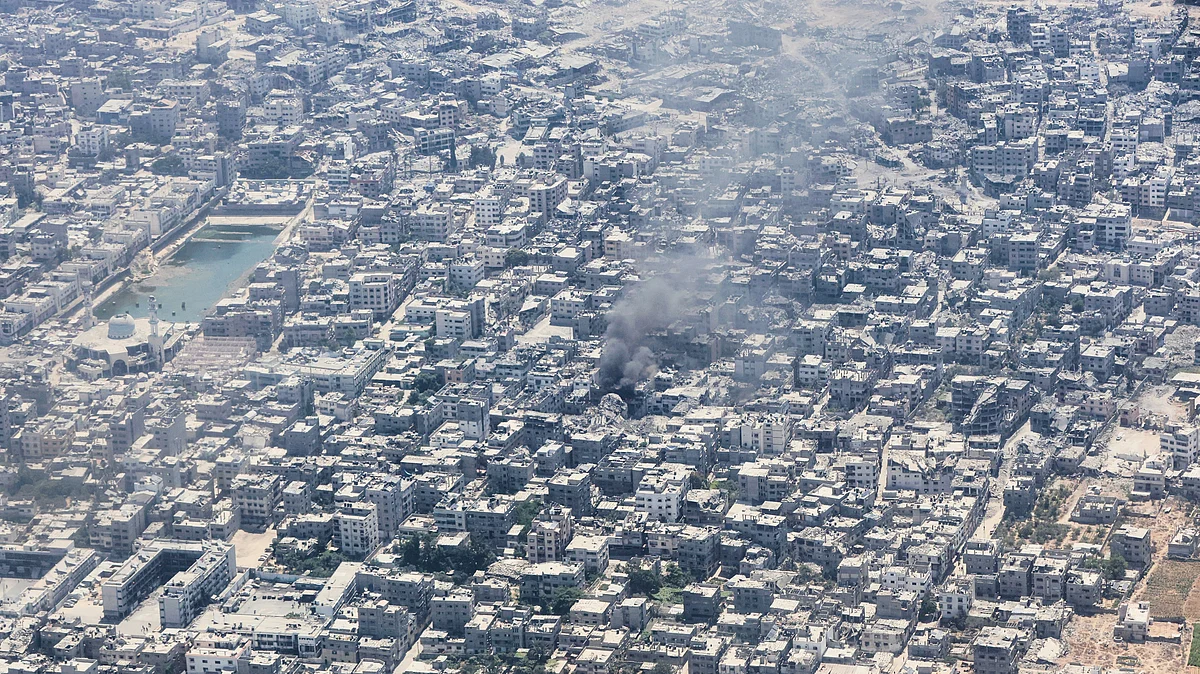World
Israel's plans to take Gaza City draws global flak, Germany suspends military exports
Israel's decision, agreed in a late-night meeting of its security Cabinet, marks a further escalation of Israel's 22-month war with Hamas

Israel said early Friday that it plans to take over Gaza City, drawing rejection from the Palestinians and international condemnation. The decision, agreed in a late-night meeting of its security Cabinet, marks a further escalation of Israel's 22-month war with Hamas. It also provoked worries in Israel over the fate of hostages still held by Hamas.
Another major ground operation would almost certainly exacerbate the humanitarian catastrophe, in which Israel's air and ground war has pushed the territory toward famine. Hamas said people in Gaza would “remain defiant against occupation”.
Israel's plan to escalate military operations in Gaza also drew international condemnation on Friday. British Prime Minister Keir Starmer urged Israel to reconsider, saying the expanded offensive would do nothing to end the conflict or secure the release of the remaining hostages. “Our message is clear: a diplomatic solution is possible, but both parties must step away from the path of destruction,” Starmer said.
Spain's foreign minister José Albares said Israel's plan would “only lead to more destruction and suffering”.
Turkey's foreign ministry said the escalation marked a new phase of Israel's “expansionist” policies in the region. “Israel must immediately halt its war plans, accept a ceasefire in Gaza, and begin negotiations toward a two-state solution,” it said in a statement on Friday.
Australia also condemned a further occupation of Gaza. Foreign minister Penny Wong said a two-state solution is the only pathway to secure an enduring peace: a Palestinian state and the State of Israel, living side-by-side in peace and security within internationally recognised borders.
Published: undefined
Meanwhile, German Chancellor Friedrich Merz on Friday said his country would not authorise any exports of military equipment that could be used in Gaza “until further notice”. Germany has been a stalwart supporter of Israel for decades.
In a statement, Merz emphasised that Israel “has the right to defend itself against Hamas' terror” and said that the release of Israeli hostages and “purposeful” negotiations toward a cease-fire in the 22-month conflict “are our top priority”. He also said Hamas must not have a role in the future of Gaza.
“The even harsher military action by the Israeli army in the Gaza Strip, approved by the Israeli Cabinet last night, makes it increasingly difficult for the German government to see how these goals will be achieved,” he added.
“Under these circumstances, the German government will not authorise any exports of military equipment that could be used in the Gaza Strip until further notice.”
However, Germany's move will be a limited measure, according to Zain Hussain, an arms transfers researcher at the Stockholm International Peace Research Institute.
German companies provide 30 per cent of Israel's defence imports, mostly naval armaments, according to Hussain's analysis. “Germany has been committed to providing Israel with arms, especially with ships," he said, citing Germany's deep support for Israel and enmeshed defence ties. Since 2018, Germany has rapidly increased its share of the Israeli arms market, mostly with naval hardware like corvettes and torpedoes.
Hussain said it was “a big deal” for Germany, one of Israel's staunchest allies, to admit it was uncomfortable with Israel's actions in Gaza. “However, I don't think this alone will stop Israel's operations in Gaza, and Israel still has the USA as a committed arms supplier,” he cautioned.
Published: undefined
Czech foreign minister Jan Lipavský said his country considers the plan by Israel to take over Gaza City “a risky step”. Lipavský said the Czechs believe that Israel will take all necessary steps to protect the civilian population and will act in line with international law while the release of all hostages and a lasting ceasefire remain priorities.
He said the only way of reaching a long-term peace is a two-state solution of the Israel-Palestinian conflict.
“The condition for that to happen is that Gaza will not be ruled by the terrorists from Hamas, which is a position shared by Czechia, Israel and a number of Arab countries in the region," Lipavský said in comments to the state-owned CTK news agency.
The Czech Republic has been one of Israel's biggest allies in the EU.
Saudi Arabia's foreign ministry condemned what it referred to as Israel's “starvation, brutal practices and ethnic cleansing” against the Palestinians. It said Palestinians have an “emotional, historical and legal connection to their land” and lamented the failure of the international community to halt the fighting.
Saudi Arabia, a major Arab power, appeared to be close to forging diplomatic ties with Israel as part of a larger agreement with the United States before Hamas' 7 October 2023 attack ignited the war.
The kingdom has repeatedly criticised Israel's wartime conduct and says it will only normalise ties in an agreement that includes major progress toward the creation of a Palestinian state, something Israel's current government and most of its political class rejects.
With AP/PTI inputs
Published: undefined
Follow us on: Facebook, Twitter, Google News, Instagram
Join our official telegram channel (@nationalherald) and stay updated with the latest headlines
Published: undefined